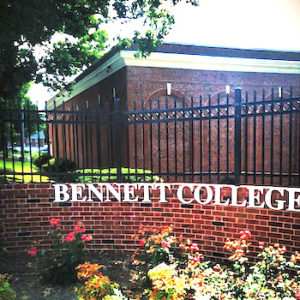
The founding of Bennett College in Greensboro, North Carolina, in 1873 is celebrated on this date. Bennett is one of the over 100 historically black colleges and Universities (HBCUs) in America and one of only two that specifically educate women.
Its first sessions were held in the basement of Warnersville Methodist Episcopal Church North, now known as St. Matthew's United Methodist Church. Newly emancipated slaves founded the school. The Freedmen's Aid and Southern Education Society of the Methodist Episcopal Church was responsible for the support of the school in 1874. In its beginning, W.J. Parker served as the first principal. Three years later, the Reverend Edward O. Thayer became president.
During the Thayer Administration, the school grew only in local enrollment, and Black parishioners of the Methodist Church at Greensboro helped raise money for land and a school building. Contributions and financial help of $10,000 from Lyman Bennett, a businessman from Troy, New York, bought land and a building large enough to house classrooms and a dormitory. Bennett died of pneumonia while seeking funds to purchase a school bell.
The institution was named Bennett Seminary in his memory, and the first building was named Bennett Hall. By 1879, the school had grown into an institution with four departments: college, normal, English courses, and music. In 1881, Reverend Wilbur F. Steele became president. In 1886, Bennett served as an industrial workplace for young women under the backing of the Woman's Home Missionary Society of the Methodist Episcopal Church. The Society established the Kent Home at a cost of nearly $4,500.
In 1889, the Reverend Charles N. Grandison was elected Seminarian, the first black president. He was also the first Black president of any institution founded by the Freedmen's Aid Society. By 1901, the collegiate division had grown to 222 enrolled students, and Bennett was worth $30,000.
Dr. Jordan Chavis, president from 1892-1905, increased enrollment (251 students) and expanded the college's physical aspect and programs. Under him, Carolina Hall, a dormitory for male students, was built. He inspired male professors, teachers, and students to donate their services to carpentry, masonry, and tinning.
Dr. Chavis was succeeded by the Reverend Silas A. Peeler in 1905. Peeler’s leadership was aggressive, and he was pretty outspoken. This may account for the fact that the Freedmen's Aid and Southern Education Society at Cincinnati saw some reason for relieving him of his office.
Professor James E. Wallace was the seventh president of Bennett College from 1913 to 1915. A president's home was built during his presidency, and the school property value rose from $36,000 to $44,500 while he was there; enrollment increased from 290 to 368.
In 1915, Reverend Frank Trigg became president, and during his tenure, the college maintained an average of 300 students. Fire destroyed Carolina Hall. By 1924, three buildings were dedicated. One professor hired by Trigg to serve as academic dean was Isaac H. Miller. Miller's son, Isaac Jr., would become college president in 1966. Trigg retired from the presidency in June 1926.
That same year, Bennett College was reorganized as a college for women. The Women's Home Missionary Society assumed a much larger responsibility for the institution as a women's college. In the wake of World War I, there were increased opportunities for women and an increased need for colleges to prepare young women for greater social and commercial opportunities. David Dallas Jones was appointed the first president of the women's college. Under his leadership, the high school campus at Bennett was closed to focus the staff's attention fully on expanding and enriching the college curriculum. Some aspects of his tenure included promoting academic excellence and cultural awareness.
After Jones's death, Willa B. Player assumed the presidency, becoming the first Black woman to serve as president of a four-year college or university. Under her guidance, Bennett College became one of the first 15 four-year Black colleges to be admitted to the Southern Association of Colleges and Schools.
As the enrollment of women in colleges increased, more attention was given to the specific types of education that Presidents of Bennett College, including David Dallas Jones, Dr. Willa B. Player, Dr. Isaac H. Miller, Jr., Gloria Randle Scott, Ph.D., Dr. Althia F. Collins, and Dr. Charles Fuget, provided. In June 2003, Dr. Johnetta B. Cole became the 14th president of Bennett College, followed by Julianne Malveaux. In 2018, Suzanne Elise Walsh became president. It is currently a coeducational institution. Noted alums include Dorothy L. Brown, Carolyn R. Payon, and more.
Bennett College,
900 E. Washington Street
Greensboro, NC 27401,
Tel: 336.273.4431, Fax: 336.378.0511